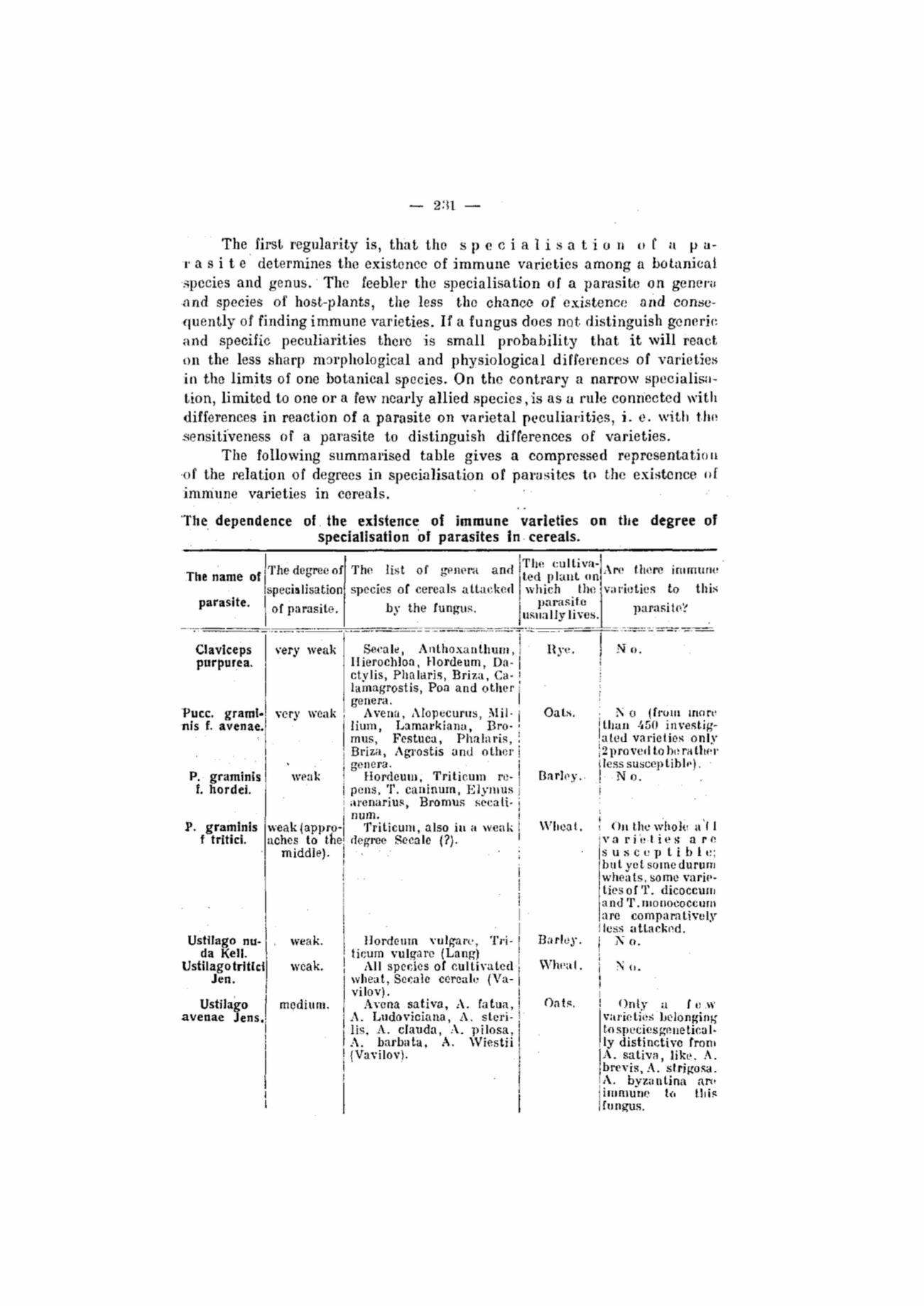

2.41 —
The first regularity is, that the s p e c i a l i s a t i o n o f a p a
r a s i t e determines the existence of immune varieties among a botanical
species and genus. The feebler the specialisation of a parasite on genera
and species of host-plants, the less the chance o f existence and conse
quently of finding immune varieties. If a fungus docs not distinguish generic
and specific peculiarities there is small probability that it will react
on the less sharp morphological and physiological differences of varieties
in the limits of one botanical species. On the contrary a narrow specialisa
tion, limited to one or a few nearly allied species, is as a rule connected with
differences in reaction of a parasite on varietal peculiarities, i. e. with the
sensitiveness of a parasite to distinguish differences of varieties.
The following summarised table gives a compressed representation
of the relation of degrees in specialisation o f parasites to the existence of
immune varieties in cereals.
The dependence of the existence of immune varieties on the degree of
specialisation of parasites in cereals.
The name of
parasite.
The degree of
specialisation
of parasite.
The list of genera and
species of cereals attacked
by the fungus.
The cultiva
ted plant on
which the
parasite
usually lives.
Are there immune
varieties to this
parasite?
Claviceps
purpurea.
very weak Secale, Anthoxanthurn,
Iiierochioa, tlordeum, Da-
ctylis, Plialaris, Briza, Ca-
lamagrostis, Poa and other
genera.
Ilye.
N o .
Pucc. grami
nis f. avenae.
very weak Avena, Alopecurus, Mil-
lium, Lamarkiana, Bro-
mus, Festuca, Plialaris,
Briza, Agrostis and other
genera.
OaLs.
N о (from more
than 'i50 investig
ated varieties only
2proved to be rather
less susceptible).
P. graminis
f. hordei.
weak
Hordeum, Triticum re
pens, T. caiimurn, Elymus
aronarius, Bromus secali-
num.
Barley.
N o.
P. graminis
f tritici.
weak (appro
aches to the
middle).
Triticum, also in a weak
degree Secale (?).
Wheat.
<)u the whole a 11
v a r i e l ie s a r c
s u s c e p t i b 1«;
btityetsomedurum
wheats, some varie
ties o fT . dicoccuin
and T .monoeoccuni
are comparatively
less attacked.
Ustilago nu-
da Kell.
weak.
Hordeum vulgare, Tri
ticum vulgare (Lang)
Barley.
N o.
Ustilagotritici
Jen.
weak.
All species of cultivated
wheat, Secale cercale (Va
vilov).
Wheal.
N o.
Ustilago
avenae Jens.
medium.
Avena sativa, A. fatua,
A. Ludoviciana, A. steri-
lis. A. clauda, Л. pilosa,
A. barbata, A. Wiestji
(Vavilov).
Oats.
•
Only a f e w
varieties belonging
to speciesgenetical
ly distinctive from
A. sativa, like. Л.
brevis, A. slrigosa.
A. byzantina arc
immune to this
fungus.
Научная электронная библиотека ЦНСХБ









